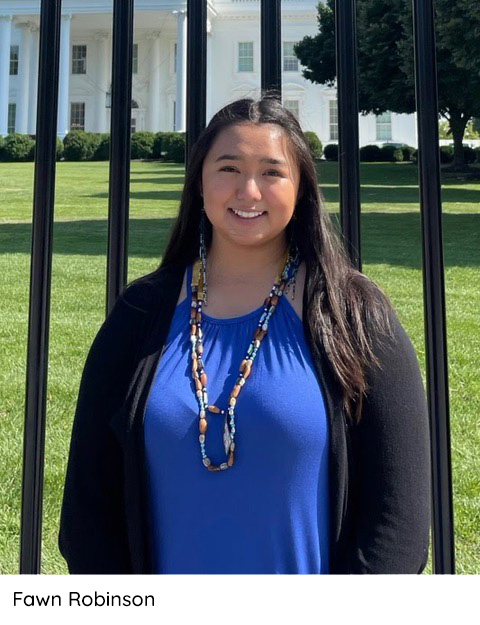Category: Housing, Justice, Listening Sessions, Personal Stories, Poverty News & Policy Updates, The Safety Net, Wealth Building, Work

October 23rd, 2024
Fawn Robinson is a Susanville Indian Rancheria (SIR) tribal member and member of the California HOPE Accounts Youth Panel of Experts.
This article originally appeared in The Institute on Race, Power, and Political Economy’s Baby Blogs.

I was five-months-old when I entered the child welfare system. Luckily, my aunt took me in. She and her husband are now my mom and dad, and they gave me a good life. At 24, I am poised to finish my bachelor’s degree in tribal administration at Haskell Indian Nations University or transfer to a UC school.
I am a tribal member of the Susanville Indian Rancheria. I am Mountain Maidu, Paiute, Washoe, Pit River, and Hopi. Serving my tribe and community has been important throughout my life. It’s also the reason I am a member of the Youth Panel of Experts advising California on its new Baby Bonds program, HOPE Accounts, for youth in foster care and children who lost a parent to COVID-19. Approximately 58,500 children will receive access to $4500 at age 18, and the money will remain available until age 26. I’m too old to qualify, but I know this program will help many young people immensely.
My mom instilled in me the importance of tribal and community service. She was part of our tribe’s Indian Child Welfare Act (ICWA) committee, which I now serve on as well. ICWA gives Indigenous children who enter foster care the opportunity to stay connected to their tribe. Ideally, a child remains with their immediate or extended family. The next option is a family in the community or a nearby tribal community. This law allowed me to grow up with my family, proud of who I am and my heritage.
As a member of the ICWA committee, I work to ensure that all youth in foster care and their families are treated fairly in any processes and that support services are offered to help them advance toward their goals. Sometimes institutions need help understanding common disadvantages and obstacles that youth face. Often, there is a stigma that youth in foster care are “too much” to deal with, or won’t amount to anything because of where they come from. But youth in foster care are resilient and can create success for themselves no matter their background. The bottom line is we are all doing the best we can with the hand we were dealt.
That’s why I am so appreciative of HOPE Accounts. It gives former foster youth opportunities to overcome financial barriers that may be a roadblock to building a life they want. When I first applied to college I was offered a scholarship to attend the University of Reno, but still wasn’t able to shoulder the financial burden. HOPE Accounts might have provided me the resources I needed to enroll.
My role in advising the state has focused on providing my perspective on HOPE Accounts based on lived experience and as an Indigenous person, including obstacles that may affect tribal communities such as a distrust of government agencies and programs. Outreach from trusted liaisons to tribal communities may be key to engagement and providing an understanding of how this program can be beneficial to foster youth, young adults, and the overall community.
This work comes at a critical time for me. My mom passed away suddenly in 2021. At the time, I was living in Salt Lake City, about to attend Haskell Indian Nations University. My siblings were still in high school and really struggling, so I came back home, planning to visit for just a couple weeks. But it didn’t feel right to leave. I put my personal goals on hold and remained with my family.
Three years later, I hope to complete my bachelor’s degree. If I transfer to a UC, I’ll now be able to afford it thanks to free tuition for tribal members. Similarly, HOPE Accounts will soon provide other youth in foster care and COVID-bereaved children a bridge to their dreams. I can’t wait to see them put these resources to use so they too have the opportunity to live the lives they envision.